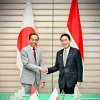The leaders of Russia, Ukraine, France and Germany have reached a ceasefire deal after 17 hours of talks in Minsk, Belarus, on the Ukrainian conflict. It believes shall offer glimpse of hope for restoring the stability in Ukraine.
The political crisis in Ukraine began at the end of 2013 marked by revolution Maidan which dragged the country into open armed conflict between the separatist region of eastern Ukraine, Donetsk and Lugansk region which oppose the new government in Kyiv under President Poroshenko whose elected through elections in May this year. The political crisis in Ukraine has involved world major and powerful countries such United States, Russia and the EU in this case Germany and France to find solution of this conflict.
Ukraine has a strategic value for its partners in the Western countries, EU particularly in related to security of supply of gas from Russia to Europe. Europe imports 86 billion cubic meters (bcm) or more than half of total supplies through Ukrainian pipelines. For Russia, Ukraine historically has traditional strategic value and multidimensional interests as equal and sovereign state after the collapse of Soviet Union in the end of 20thcentury.
The strategic points and importance of Ukraine for both sides should be understand and synergized by the West and Russia in a manner way in conducting sustainable development. For Europe, the participation of Ukraine into Association Agreement as the foundation for Ukraine to join the EU membership is an important step for economic and social development of Ukraine, yet the design of policies to formulate a national consensus related Ukraine membership in the EU need a conscientious decision making process. According to a survey conducted by the International Foundation for Electoral Systems (IFES), respondents were asked about Ukraine possibly taking steps to join the European Union (EU) or the Customs Union. Opinions are divided, with 37 percent of Ukrainians indicating support for the country to join the EU and 33 percent indicating preference for the Customs Union. There are significant regional differences on this issue as there is greater support for Ukraine taking steps to join the EU rather than the Customs Union in the West (73 percent versus 5 percent) and in Kyiv (64 percent versus 10 percent), while there is greater support for joining the Customs Unions rather than taking steps to join the EU in the South (62 percent versus 14 percent) and the East (46 percent versus 20 percent).
The survey results should be considered not only for the Ukrainian government, but also the countries involved in the Minsk Agreement to define a new structure in the domestic policy of Ukraine and the Ukrainian foreign cooperation policy, especially in the field of economic cooperation, trade and investment.
the survey conducted by IFES, the respondent only offered by two models of integrations, the European Union or the Custom Union, but Ukraine as a country which vulnerable to political instability after the orange revolution of 2004 and the hit of economic crisis in 2008, a comprehensive policy to adopt to one of integration not an appropriate approach to recover the Ukrainian frustrated economic crisis.
In sphere of trade, Ukraine is one of major trading partner for Russia and EU countries as well, From January-October 2014, Ukraine exported about $8.8 billion worth of goods and services to the Russian Federation while importing roughly $11.2 billion. Russia’s share of Ukraine’s exports and imports was 19 and 25% respectively, far larger than that of any other single country. The EU is Ukraine's second largest trading partner: in 2012, 28,7% of all Ukrainian exports of goods went to the EU and 39,1% of imports of goods came from the EU. EU-Ukraine trade in goods reached €36.6 billion in 2012 (an increase of 5,8% compared to 2011). Ukrainian exports to the EU are to a large extent already liberalized thanks to the Generalized System of Preferences (GSP), which the EU granted to Ukraine in 1993. In 2013, more than 70% of Ukrainian exports to the EU of machinery and mechanical appliances, plants, oils, base metals, chemicals and textiles benefitted from GSP preferential tariffs.
In Russia’s view, if Ukraine signs the EU association agreement, it would be necessary to revise different technical standards – sanitary and phytosanitary, veterinary, and other. Russia and Ukraine hold around 400 agreements, 40 of which are basic and cannot be “just put aside and forgotten.” It will force Russia to reconsider the duties and the collections systems, which exist at present between Ukraine and the countries of the Customs Union, such as Russia, Belarus, and Kazakhstan," While in investment sphere, over the past 20 years, Russia claims the total investment has reached around $200 billion in the Ukrainian economy, while EU investment only in 2012 has reached € 20,4 billion.
Those different perceptions in how Russia and EU perceived their economic contribution and effects to the economic development of Ukraine has sunk economic of Ukraine to the devastated level in last 10 years after Ukraine gained its independence.
Ukraine now essentially needs of significant economic recovery through constructive cooperation and assistance from Russia and the EU, Minsk Agreement could be an important step for Parties which sat in Minsk to “take a fresh air” and consider further actions to deelop a newly Ukraine political structures in order to establish sustainable development of Ukraine to put the country back as an important player in global economic development.
http://eeas.europa.eu/delegations/ukraine/eu_ukraine/trade_relation/bilateral_trade/index_en.htm
http://rt.com/business/159916-russia-investment-ukraine-ulyukaev/
http://ec.europa.eu/trade/policy/countries-and-regions/countries/ukraine/
Ukraine









